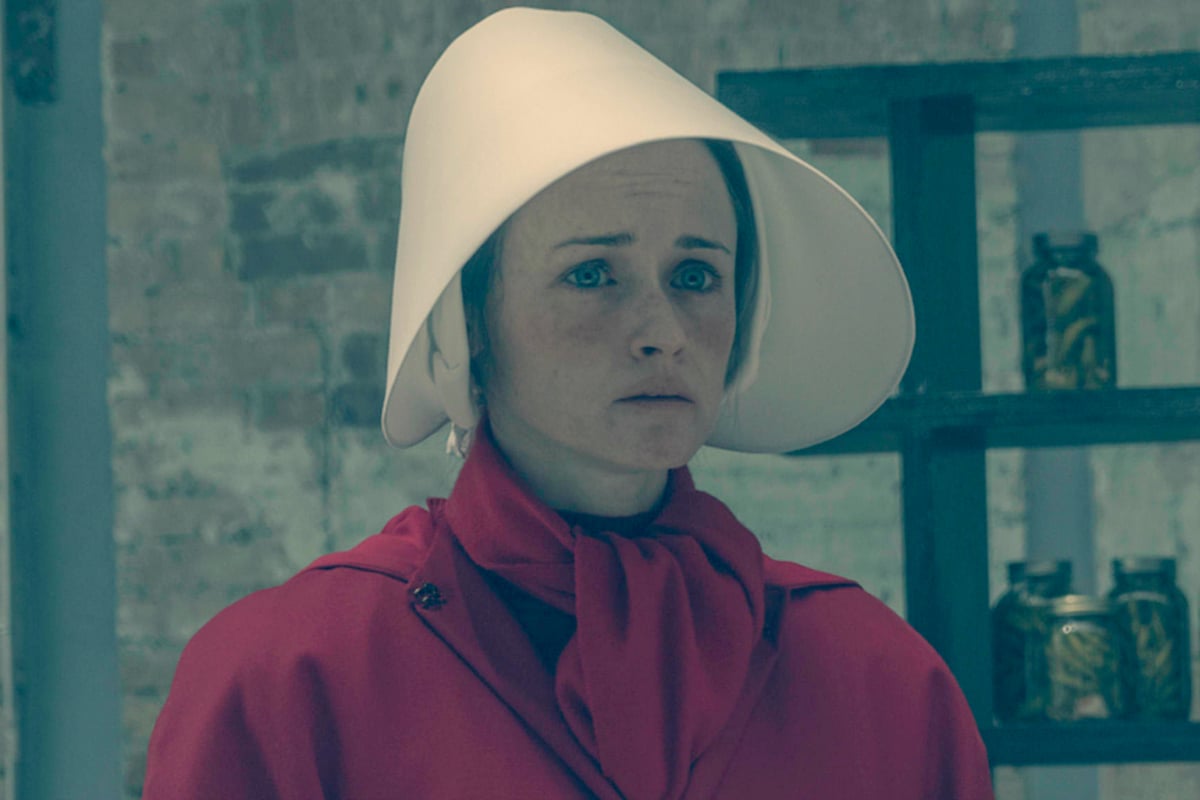
Warning: Spoilers for The Handmaid’s Tale Season 3 ahead.
Thirty six minutes into episode one of The Handmaid’s Tale season 3, I began to cry.
As Emily (played by Alexis Bledel) walked into a Canadian hospital cradling her friend’s baby, she was greeted with love. Doctors, nurses and patients began to cheer for their safe arrival.
The pair had been smuggled across the border, fleeing the authoritarian regime that ruled their home country, Gilead; a place where women were raped and stripped of their fundamental rights.
The baby’s mother, June (Elisabeth Moss), had remained behind in the hope of rescuing her other daughter from the same fate.
Myth-busting facts about refugees. Post continues after video.
When she arrived in Canada, Emily was not asked if she was a terrorist, if she had come for economic reasons, or if she could live in line with true Canadian values and was willing to assimilate. She was asked if she was okay, and told to watch her cholesterol.
She was, by all means, welcomed home by a country that was not her own.
And so I cried. But my tears were not of joy or celebration, they were of distress.
It struck me that if Emily, a white refugee woman, arrived in Australia with a white baby, we would likely have greeted her with applause too. Sadly, that welcome is far from the kind that’s extended to refugees of colour who seek shelter on our shores.

Top Comments
So now we should change our refugee policy because of a TV fantasy show? After watching X-men I urge Scott Morrison to urgently pass laws to protect the rights of mutant superheroes, currently they have no legal protections in Australia and that’s a disgrace.
No, we should change them because they are against human rights law and completely inhumane. But nice try there.
Oh really? Against Human Rights Law you say? Guess you can tell us which court has found us guilty of exactly what then?
If our treatment of uninvited guests is completely inhumane, I wonder why they continue to travel half way around the world, past the nearest safe country, through the biggest democracy in the world, over the worlds largest Islamic nation and on to this nasty place in many cases?
Drop it, your side had their go at refugee policy, the results being it cost us billions, turned popular sentiment against refugees and a couple thousand drowned at sea that somehow you will perform the mental gymnastics to believe is not the fault of people smugglers or those who encouraged boat people, but the fault of all
Australia.
Australia takes thousands upon thousands of refugees every year, most of them not white who have applied via the right process (and whom have likely been settled in areas not the writer's own as she seems oblivious to this. A visit to Blacktown or Fairfield in Sydney would be a good start). If we were to take all who tried to jump queue via exploitative people smugglers, not it would not only be unfair to those who sought refuge via proper channels, it would also set a shocking precedent with boats en masse on route. Chaos.
Many areas have no queuing system and refugees have no paperwork to apply even if there was a queue. I'm not sure who you chose to reference refugees as "most of them not white". Is skin colour relevant?
If there is no queue, why pay thousands of dollars to people smugglers and risk your life when you could just make a phone call and apply? What do you get for all that money?
There are no Anglo countries currently that are a major source of refugees.
There is no queue
Then why get on a boat from Indonesia when you could just walk up to our embassy, make a phone call to the Department of Immigration, contact the government by the internet or ask a local Indonesian to help you contact Australia? Why not do this from the airport in Malaysia, Indonesia or Singapore you flew into when you still had your ID you used to get on the plane? I’ve been to Changi airport a few times, plenty of phones, internet points, information desks, police and officials there.
Because there is no queue, no need to get on a boat right? It’s just a walk up start to come here as a refugee?